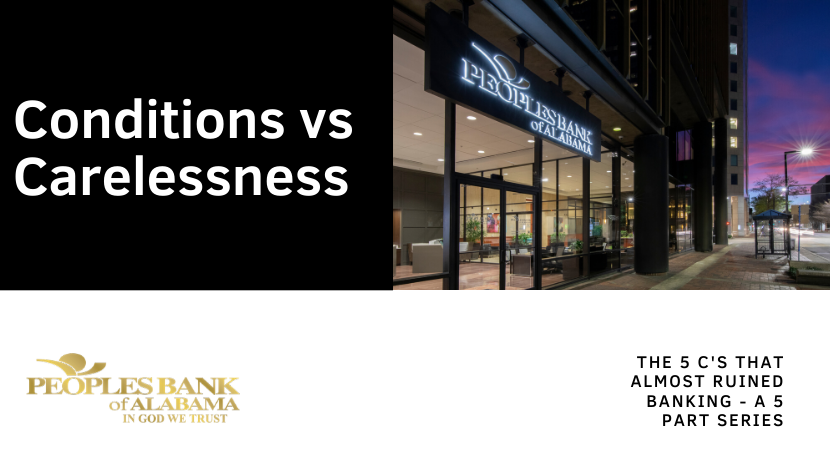The 5 C's That Almost Ruined Banking, Part 5

Well, we have finally made it! This is the final article of our 5-part series on the changes in Small Business underwriting that almost ruined banking! The prior articles focused on how the first four “C’s” called Character (a measurement of intentionality), Capacity (the borrower’s ability to repay the loan from operations), Capital (the amount of cash or equity invested into the project by the borrower) and Collateral (the assets pledged as a secondary source of repayment) have been replaced with the new words “Camouflage” (skeletons kept hidden in the closet), “Caffeine” (I want it all and I want it now), “Compensation” (when banks pay more attention to their own income statement than to the borrower’s) and “Certainty” (collateral value, especially real estate, would never go down). These mistakes have led to the heavy regulations we face today.
Conditions
This final installment reviews the fifth “C” called Conditions. Conditions refers to the outside influences that can affect the business and its success. For example, if the borrower is a plumbing sub-contractor who works on new residential construction and the credit markets tighten up so much that no one can get approved for a loan to buy a new home, how will the borrower survive if there are no new homes being built? Or, what if the borrower manufactures a product that is dependent on parts shipped in from Japan and a tsunami wipes out the Japanese shipping port? How will the borrower get the parts he needs to survive? Or even more immediate, if COVID-19 requires your business to be closed for months on end, how can you be expected to keep your business open if you can’t generate revenue? These are real life issues that lenders must consider when looking at the big picture of the loan. While we will never be able to mitigate every risk, we must at least be aware of potential issues that could affect the borrower – and to be fair, no one could have predicted the impact COVID-19 has had on our economy!
Carelessness
During the 2008 recession, conditions were replaced by what I call “Carelessness." Society was lulled into the false pretense that everyone deserved a home of their own. So, when contractors overbuilt new homes, the government made it easier for those homes to be purchased by allowing banks to provide highly leveraged variable rates. As a result, when interest rates began to rise, the increased payments caused many borrowers to default on their loans and the credit markets began to shut down the funding vehicles where lenders got their money. No one is without blame; however, because we were careless and didn’t consider how one spark can cause a forest fire, things got out of control.
Hopefully we learned our lessons and are more committed to the tried and tested principles of underwriting business loans based on the “5 Fundamental C’s” (Character, Capacity, Capital, Collateral and Conditions) rather than on the “5 Detrimental C’s” that got us into a mess (Camouflage, Caffeine, Compensation, Certainty and Carelessness). Let’s be thankful that banks today are stronger than ever!
If you are already a bank customer, thank you for your loyalty and please let us know of any ways we can help. For those looking for a trusted banking partner, we'd love the opportunity to earn your business.
